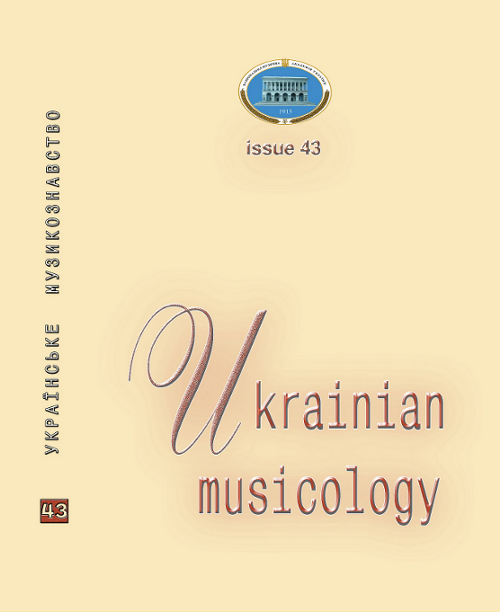«Harakiri» and «Radames» by Peter Eötvös: European reading of Japanese traditions in the operatic drama of the XX century
DOI:
https://doi.org/10.31318/0130-5298.2017.43.0.131923Keywords:
chamber opera, theater «noh», kabuki, shakuhachi, harakiri, bunrakuAbstract
In the article two chamber operas of the Hungarian composer, Peter Eötvös, «Harakiri» and «Radames» are considered. They represent the early period of the operatic creativity of the author. The conditions and the history of creation the operas, as well as the intonational-dramaturgic analysis of the theatrical words were made. The influence of varieties of the Japanese traditional theater, with which the composer was familiarized during his trip to Japan, was clarified: noh, bunraku, kabuki. The use of Japanese traditions at different levels was revealed in both cases. The chamber opera "Harakiri" revealed not only Japanese traditional ritual themes, but also the use of characteristic Japanese vocals and traditional wind instruments - shakuhachi. In the case of the chamber opera «Radames», the use of the Japanese puppet theater, the bunraku, was revealed, not at the thematic, but at the technical level, which is primarily manifested in the reception of the management of one actor by three directors at once. Thus, the influence of the theater of the absurd on the given theatrical work of the Hungarian composer was also revealed. As a result of the analysis of music, writing process conditions, literary sources, as well as compositional methods concerning these two chamber operas, their significance in creating the following already full-scale theatrical compositions by the Hungarian composer, Peter Eötvös, was clarified. The article also considers variants of modern interpretations of the analyzed compositions.
References
Eötvös, P. Libreto opery «Xarakiri» [Libreto of opera «Harakiri»]. Available at: http://eotvospeter.com/index.php?node=compositions&id=6&function=&targetpage=texts¤t_menu=compositions_commissions (Accessed : 20.10.2017).
Pospelov, P. Russkaya opera na chuzhbine [Russian opera in a foreign land] Available at: https://iz.ru/author/petr-pospelov
Tsenova, V. (2005). Teoriya sovremennoy kompozitsii: ucheb. posobie [The theory of modern composition: a textbook]. Moskva : Muzyka, 624.
Chhartishvili, G. (2003). Pisatel i samoubiystvo [Writer and suicide].Izd. 3.Moskva : Novoe literaturnoe obozrenie, 574.
Eötvös, P., Amaral, P. (2015). Parlando-rubato. Beszélgetések, monológok és egyéb kitérök [Parlando-rubato. Conversations, Monologues and Other Guides]. Budapest : Rózsavölgyi és Társa, 310.
(2012). Les opéras de Peter Eötvös. Entre orient et occident [The operas of Peter Eötvös. Between East and West]. Sous la direction de M. Grabócz. Paris : Éditions des archives contemporaines, 174.




